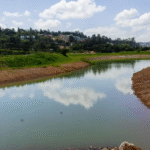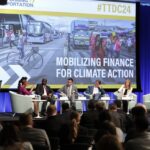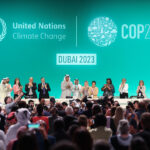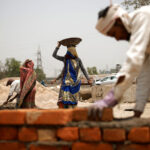Posts tagged with 'The World Bank'
Walking through Nyandungu Eco-Park in Kigali, Rwanda, it’s difficult to imagine that just a few years ago, industrial machinery and bedraggled grasses stood where lush trees and flowers now grow. Like in many wetlands across the city, the incursion of polluting industry ...

Road traffic crashes kill about 1.19 million people each year and seriously injure another 20 million to 50 million. Pedestrians, cyclists and motorcyclists — the most vulnerable road users — account for half of these deaths and injuries. Even people in motor ...

By midday in Mathare, a densely populated informal settlement in Nairobi, Kenya, the sun beats down on the tight rows of wooden stalls and corrugated metal rooftops. At an elevation of 5,889 feet (1,795 meters), Nairobi has long been known ...

What does it take for cities to create a true systems change that creates a holistic, positive shift of the entire urban system? Finding and celebrating examples of this feat is at the heart of the WRI Ross Center Prize for Cities. Since ...

Transforming Transportation 2025 is in the books. After a year of geopolitical turmoil and escalating climate impacts, the transport sector is seeing rapid change on multiple fronts. Across two days of events, leaders in government, business, academia and civil society ...

Africa’s cities, from large metropolises to smaller towns, are increasingly characterized by growing urban sprawl. Kinshasa, Democratic Republic of Congo, is expanding by about 2,000 people and 5 hectares (10 football fields) every day, according to a World Bank estimate. Kumasi, an intermediary ...

Transport is one of the fastest-growing sources of greenhouse gas emissions, accounting for 24% of carbon emissions worldwide. Nearly three-quarters of those emissions come from road vehicles. Solutions like electrification and increased public transport can reduce the transport sector’s emissions, but they ...

For the 21 million residents of Lagos, Nigeria, climate change is not a distant concept — it is a current reality. Over the past decade, the city has experienced devastating floods, exacerbated by the loss of over half of its wetlands ...

The way we make and use energy is changing. With prices falling and technology more widely available, clean energy uptake is growing rapidly. Investment in new clean power now outpaces investment in fossil fuels. This represents tremendous progress — but affordable technology ...

For more than 20 years, WRI has identified annual “stories to watch.” These are the year’s moments, issues and decisions that we believe will shape the future trajectory of the world. In the past, we’ve highlighted things like dangerous heat in cities, ...

Moldova’s capital city, Chișinău, recently secured a €20 million investment to tackle flooding and pollution of the Bîc River, aiming to transform it into a valuable recreational amenity for 100,000 residents and mitigate future flood risks. This funding, which combines loans from ...

As the first week of COP29 drew to a close with intense debates on climate financing and ambitious targets, and just days before the G20 Leaders’ Summit, another international forum turned Rio de Janeiro into the epicenter of discussions on ...

If a picture can tell a whole story, then the image below of an intersection in Dar es Salaam, Tanzania, shows the past, present and future of global transformation in the transport sector. During Transforming Transportation 2024, which focused on ...

By David Waskow, Jennifer Layke, Nate Warszawski, Preety Bhandari, Gabrielle Swaby, Natalia Alayza, Jamal Srouji, Mario Julien Díaz, Edward Davey, Rogier van den Berg, Roman Czebiniak, Paige Langer and Nathan Cogswell on December 19, 2023
The COP28 climate talks began with a new fund to address the increasingly severe losses and damage vulnerable countries face from climate impacts and concluded with the first international agreement to tackle climate change’s main driver: fossil fuels. Those bookends to the Dubai summit ...

The past year registered record-shattering global temperatures. People around the world are already witnessing epic heat waves, wildfires and drought at 1.1 degrees C (2 degrees F) of global warming, compared to pre-industrial averages. With current policies putting the world on ...




























